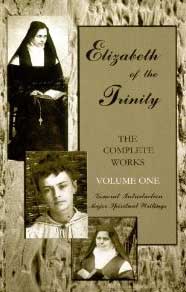Episode 2 Beginning to Pray: Â “Heaven in Faith” Â Day 1 Prayer 2 – “Abyss calls to Abyss”
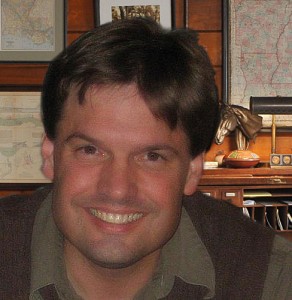
[powerpress]
Dr. Anthony Lilles is a Catholic husband and father of three teaching Spiritual Theology at St. John Vianney Theological Seminary. He  teaches spiritual theology and spiritual direction to transitional deacons, and the spiritual classics to the men who enter the Spirituality Year, a year of prayer in preparation for seminary formation.  He is the author of the “Beginning to Pray”  catholic blog spot.
From “Beginning to Pray: Your Life Hidden in Christ“:
Elisabeth of the Trinity says that the journey to contemplative prayer (which she refers to as the pathway of the abyss), requires that we die to trying to live merely by natural lights. Instead we must seek to live hidden with Christ in God. She taught this because she understood the peace and strength such a life provides – she herself thrived in it. Christ is the supernatural Light, the inexhaustible source of loving knowledge of God in our hearts. If we live by the loving knowledge that Christ alone provides we discover that we are invincible to things which “pass away”, for our hearts transcend them, “seeking God alone.” (Heaven in Faith, #11).
Other episodes in the series can be found here
We would like to offer heartfelt thanks to
Miriam Gutierrez for providing for us “the voice” of Blessed Elizabeth for this series
For other episodes in the series visit the Discerning Hearts page for Dr. Anthony Lilles
Tags: Anthony Lilles, blessed elizabeth of the trinity, carmelite, catholic, catholic podcast, catholic prayer, cathollc spirituality, contemplative prayer, Discerning Hearts, heaven in faith, Miriam Gutierrez, prayer, St. John Vianney Theological Seminary
This entry was posted on Wednesday, January 18th, 2012 at 10:25 pm
You can follow any responses to this entry through the RSS 2.0 feed.
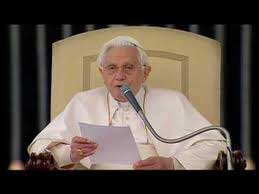 INVOKING THE GIFT OF UNITY AMONG CHRISTIANS
INVOKING THE GIFT OF UNITY AMONG CHRISTIANS
VATICAN CITY, 18 JAN 2012 (VIS) – The Week of Prayer for Christian Unity, which begins today, was the theme of Benedict XVI’s general audience celebrated this morning in the Paul VI Hall. The Holy Father explained how this initiative has been held annually for more than a century and brings together Christians from Churches and ecclesial communities, who “invoke that extraordinary gift for which the Lord Jesus prayed during the Last Supper: … ‘That they may all be one'”.
The Week of Prayer – established in 1908 by Paul Wattson, founder of an Anglican religious community who later entered the Catholic Church – “is one of the most effective annual expressions … of the impetus which Vatican Council II gave to the search for full union among all Christ’s disciples”, said the Pope. “This spiritual event, which unites Christians from all traditions, increases our awareness of the fact that the unity we strive for cannot result merely from our own efforts; rather, it is a gift we receive and must constantly invoke from on high”.
The texts for this year’s Week of Prayer have been prepared by a group of representatives from the Catholic Church, and from the Polish Ecumenical Council which proposed the theme of “We will all be changed by the victory of our Lord Jesus Christ”. The history of Poland – marked by defeats and victories, by the struggle to end oppression and achieve freedom – led the ecumenical group to reflect more deeply upon what it means to “win” and to “lose”.
In this context the Pope pointed out that, “in contrast to ‘victory’ understood in triumphal terms, Christ shows us a very different way. His victory does not involve power and might. … Christ speaks of victory through love, mutual assistance and boosting the self-esteem of those who are ‘last’, forgotten, excluded. For all Christians, the best expression of such humble service is Jesus Christ Himself, His total gift of self, the victory of His love over death. … We can share in this ‘victory’ only if we allow ourselves to be transformed by God”.
Likewise, “the unity for which we pray requires inner conversion, both shared and individual. But this must not be limited to cordiality and cooperation; we must reinforce our faith in God; … we must enter into the new life in Christ, Who is our true and definitive victory; we must open to one another, accepting all the elements of unity which God has conserved for us; … we must feel the pressing need to bear witness, before the men and women of our time, to the living God Who made Himself known in Christ”.
Tags: catholic, catholic podcast, catholic prayer, cathollc spirituality, christian unity, pope benedict xvi
This entry was posted on Wednesday, January 18th, 2012 at 8:50 am
You can follow any responses to this entry through the RSS 2.0 feed.
[powerpress] Msgr. Esseff reflects on the major area that separates us from God…it’s sloth.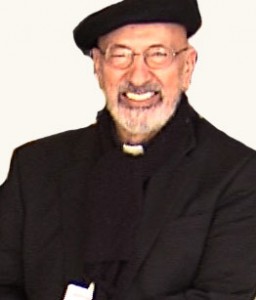 What is the truth about sloth? What does laziness really look like? To depend on oneself more than on God….”that I can do anything”, “I can do it”….the man of faith says “God can do it”. Jesus said without the Father, he could do nothing. That He does only what the Father tells him. The solution to sloth is
What is the truth about sloth? What does laziness really look like? To depend on oneself more than on God….”that I can do anything”, “I can do it”….the man of faith says “God can do it”. Jesus said without the Father, he could do nothing. That He does only what the Father tells him. The solution to sloth is 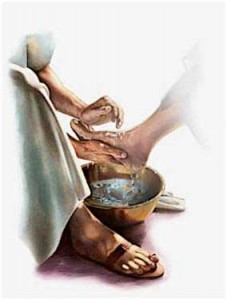 obedience…the obedience to the will of the Father.
obedience…the obedience to the will of the Father.
Msgr. Esseff takes a strong look at King David and his actions after he becomes king…a leader who became consumed with himself. Then he looks at a true leader…Jesus. Msgr. has a strong message and challenge for families, our country, the world and our Church.
Be sure to visit Msgr. Esseff’s website “Building a Kingdom of Love” for more
Tags: catholic, catholic podcast, catholic prayer, cathollc spirituality, msgr. jkohn esseff, sloth, zeal
This entry was posted on Wednesday, January 18th, 2012 at 8:36 am
You can follow any responses to this entry through the RSS 2.0 feed.
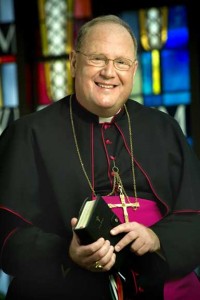 Archbishop Dolan reflects on Saint Josephine Bakhita, a grammar school visit that helped him define human dignity as “God who loves you so much He can’t take his eyes off you,” and the Magna Carta as various means by which the doctrine of the dignity of the human person may be explained.
Archbishop Dolan reflects on Saint Josephine Bakhita, a grammar school visit that helped him define human dignity as “God who loves you so much He can’t take his eyes off you,” and the Magna Carta as various means by which the doctrine of the dignity of the human person may be explained.
Tags: Archbishop Timothy Dolan, catholic, catholic podcast, catholic prayer, cathollc spirituality, grammar school visit, human dignity, Saint Josephine Bakhita, the Magna Carta
This entry was posted on Wednesday, January 18th, 2012 at 12:15 am
You can follow any responses to this entry through the RSS 2.0 feed.
Mark breaks open St. Paul’s letter to the Philippians–
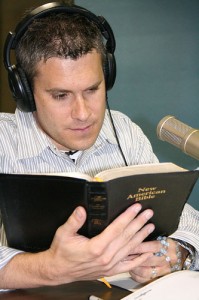
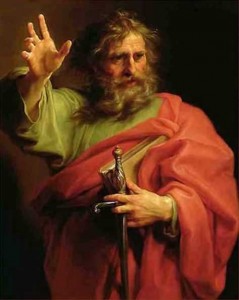 Exactly who was St. Paul writing to in his letter to the Philippians? What was the purpose of the letter? Â What was the message? Â How does it apply to our lives today?
Exactly who was St. Paul writing to in his letter to the Philippians? What was the purpose of the letter? Â What was the message? Â How does it apply to our lives today?
[powerpress]
Mark Hart is an author, speaker, director and teacher, Mark’s work both written and spoken, is known across the country and world. While he serves as the Vice President of LIFE TEEN, he is known to tens of thousands simply as the “Bible Geek ®†Mark passionately echoes the gospel to all he encounters. He is as deep as he is funny, and his love for his wife and daughters is second only to his immense love for Jesus Christ.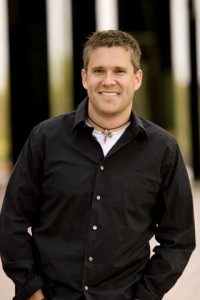
Visit Mark at www.lifeteen.com
Tags: catholic, catholic podcast, catholic prayer, cathollc spirituality, letter to the philippians, life teen, mark hart, Paul's letter to the Philippians, st. paul, St. Paul's letter to the Philippians
This entry was posted on Tuesday, January 17th, 2012 at 8:59 am
You can follow any responses to this entry through the RSS 2.0 feed.
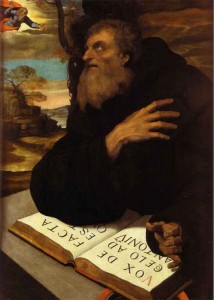 SAINT ANTHONY THE GREAT OF EGYPT: INSTRUCTIONS AND SAYINGS. Orthodox Christian Icons of St. Anthony. Chant in Greek “Kyrios pimonei”.
SAINT ANTHONY THE GREAT OF EGYPT: INSTRUCTIONS AND SAYINGS. Orthodox Christian Icons of St. Anthony. Chant in Greek “Kyrios pimonei”.
St. Anthony the Great (251- 356), Egyptian saint, one of the great Fathers of the Church. Founder of Christian monasticism, the pinnacle of holy monks. The first desert hermit. Much venerated in Orthodox and Catholic Churches.
His miracle-working relics (body) is kept in Saint-Antoine-l’Abbaye in south-eastern France (since 980, being transferred from Constantinople, there from Alexandria in Egypt). In France, at his relics, St. Anthony’s is credited with assisting in a number of miraculous healings, primarily from ergotism, which became known as “St. Anthony’s Fire”. He was credited by two local noblemen of assisting them in recovery from the disease. They then founded the Hospital Brothers of St. Anthony in honour of him. For century, thousands of deadly sick people flocked to his relics in Saint-Antoine in France for healing.
Tags: catholic, catholic podcast, catholic prayer, cathollc spirituality, Orthodox Christian Icons, st anthony, st. anthony of the desert, st. anthony the great
This entry was posted on Tuesday, January 17th, 2012 at 6:03 am
You can follow any responses to this entry through the RSS 2.0 feed.
Faith and Reason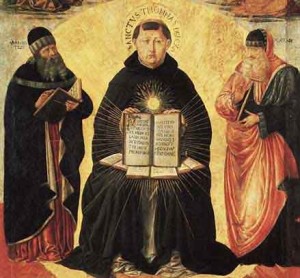
[powerpress]
“Come let us reason together, says the Lord†– Isaiah 1:18.
Many in our day strictly divide faith and reason, seeing science as based on logic and objective truth, but religion as solely emotional and subjective.
Not so, says the Catholic Church. Faith and reason complement and assist one another in the pursuit of truth. All truth is God’s truth and ultimately leads to Him who is Truth itself, Jesus Christ, so there is nothing to fear from scientific inquiry.
In fact, for centuries the Catholic Church was the patron of the arts and sciences. St. Thomas Aquinas used Greek philosophy to show the logical foundation of the Catholic Faith, many of the great scientific discoveries have been made by Catholic priests or scientists, convinced that the universe operated by fixed laws established by the one true God, not the mere whims of the gods as the pagans had previously believed.
Of course, faith is a gift and is not based on reason alone. Nevertheless, as Sir Thomas More says in the classic film A Man For All Seasons, “God made the angels to show His splendor, the animals for their innocence, and the plants for simplicity, but God made man to serve him wittily in the tangle of His mind.â€
Tags: catholic, catholic podcast, catholic prayer, cathollc spirituality, faith and reason, Faith and Reason Faith, jesus christ, thomas aquinas
This entry was posted on Monday, January 16th, 2012 at 8:16 am
You can follow any responses to this entry through the RSS 2.0 feed.
Episode 1 Beginning to Pray: Â “Heaven in Faith” Â Day 1 Prayer 1 Â – “Remain in Me”

[powerpress]
Dr. Anthony Lilles is a Catholic husband and father of three teaching Spiritual Theology at St. John Vianney Theological Seminary. He  teaches spiritual theology and spiritual direction to transitional deacons, and the spiritual classics to the men who enter the Spirituality Year, a year of prayer in preparation for seminary formation.  He is the author of the “Beginning to Pray”  catholic blog spot.
From “Beginning to Pray”:
Elisabeth of the Trinity  understood her mission to be to help people enter into deep prayer. A carmelite nun, she saw self-occupation as a huge block to prayer and actually said that she would help lead souls out of themselves and into God. She was convinced that once we are free of our big fat ego – God is able to transform us in love. She called this transforming encounter with the Lord “the divine impact.”
With her love for the Scriptures, her devotion to the Trinity, her captivation with Christ’s salvific work – her writings are filled with helpful insights. Not everyone finds her easy to read – her flow of thought follows a musical composition rather than the rules of logic – and she is dense with quotations from the mystical tradition of the Catholic Church. Although she only lived to the age of 26, from the beginning of the Twentieth Century to today, many contemplatives have found her solid teaching helpful.
We would like to offer heartfelt thanks to
Miriam Gutierrez for providing for us “the voice” of Blessed Elizabeth for this series
For other episodes in the series visit the Discerning Hearts page for Dr. Anthony Lilles
Tags: Anthony Lilles, Blessed Elizabeth, blessed elizabeth of the trinity, carmelite, catholic, catholic podcast, catholic prayer, cathollc spirituality, Discerning Hearts, heaven in faith, Miriam Gutierrez, prayer
This entry was posted on Friday, January 13th, 2012 at 2:30 pm
You can follow any responses to this entry through the RSS 2.0 feed.
What is the “Roman Canon”?  Fr. Milton Walsh helps us to answer that question and enter deeply into the mystery found in this beautiful Eucharistic prayer.  Drawing from the best of biblical and liturgical scholarship, Fr. Walsh offers a beautiful 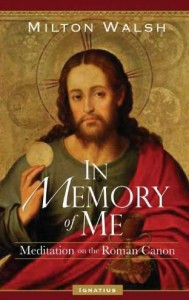 meditation that can help priests, religious, and laity deepen their understanding of the text that for centuries was the only Eucharistic prayer used in the Roman Rite.  This is a great book to give those in Catholic Adult Formation programs, like the RCIA, Diaconate training, Religious Education Catechist, as well as to the average “pew person” who longs for a deeper encounter in the depths of our Sacred Liturgy.
meditation that can help priests, religious, and laity deepen their understanding of the text that for centuries was the only Eucharistic prayer used in the Roman Rite.  This is a great book to give those in Catholic Adult Formation programs, like the RCIA, Diaconate training, Religious Education Catechist, as well as to the average “pew person” who longs for a deeper encounter in the depths of our Sacred Liturgy.
[powerpress]
You can Fr. Walsh’s book here
With a revised English translation of the venerable Roman Canon, many Catholics will be hearing it with new ears. This book will help them hear it with a new heart. Don’t just study the new words, step into the soul of Eucharistic Prayer I. —Rev. Paul Turner, Former president of the North American Academy of Liturgy
Tags: catholic, catholic podcast, catholic prayer, cathollc spirituality
This entry was posted on Friday, January 13th, 2012 at 9:01 am
You can follow any responses to this entry through the RSS 2.0 feed.
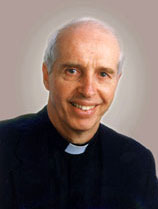 First Reading and Psalm
First Reading and Psalm
1 Samuel 3:3-10, 19
Psalm 40:2, 4, 7-8, 8-9, 10
Second Reading, 1 Corinthians 6:13-15, 17-20
The Gospel, John 1:35-42
Fr. Francis Martin is a renowned Scripture scholar and Professor Emeritus of New Testament at the Dominican House of Studies in Washington, D.C. Fr. Martin is a priest of the Archdiocese of Washington, D.C. where he is also chaplain of the Mother of God Community in Gaithersburg, MD.
Tags: catholic, catholic podcast, catholic prayer, cathollc spirituality, Dominican House of Studies, Fr, Fr. Francis Martin, Francis Martin, gospel of john, Sunday Readings
This entry was posted on Friday, January 13th, 2012 at 8:01 am
You can follow any responses to this entry through the RSS 2.0 feed.
Episode 1 – The School of Prayer: Reflections on the teachings of Pope Benedict XVI –  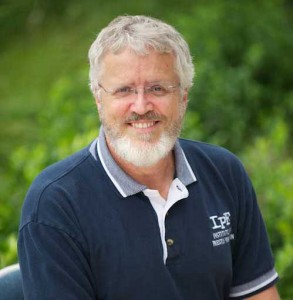  “Life without prayer has no meaning or points of reference”.  The relationship between the Father and the Son and the Holy Spirit  is so essential to our understanding of prayer.  The meaning of the Church.  Suffering the coming of the Holy Spirit.  Jesus is the face of God.  Do not be afraid, He will teach you happiness.
 “Life without prayer has no meaning or points of reference”.  The relationship between the Father and the Son and the Holy Spirit  is so essential to our understanding of prayer.  The meaning of the Church.  Suffering the coming of the Holy Spirit.  Jesus is the face of God.  Do not be afraid, He will teach you happiness.
[powerpress]
Deacon James Keating, PhD, the director of Theological Formation for the Institute for Priestly Formation, located at Creighton University, in Omaha.
From  Pope Benedict’s 1st audience on prayer:
Human life is a fabric woven of good and of evil, of undeserved suffering and of joy and beauty that spontaneously and irresistibly impel us to ask God for that light and that inner strength which support us on earth and reveal a hope beyond the boundaries of death.
In the examples of prayer of the various cultures which we have considered, we can see a testimony of the religious dimension and of the desire for God engraved on the heart of every human being, which receives fulfilment and full expression in the Old and in the New Testament. The Revelation, is in fact purifying and brings to its fullness man’s original yearning for God, offering to him, in prayer, the possibility of a deeper relationship with the heavenly Father.
At the beginning of our journey in the “school of prayer†let us now ask the Lord to illumine our minds and hearts so that the relationship with him in prayer may be ever more intense, affectionate and constant. Once again, let us say to him: “Lord, teach us to pray†(Lk 11:1).
For more information on the “Institute of Priestly Formation†and for other material available by Deacon Keating, just click here
Don’t forget to pickup a copy of “Communion with Christ†, it is one of the best audio sets on prayer…ever!
Check out Deacon Keating’s “Discerning Heart†page
Tags: catholic, catholic podcast, catholic prayer, cathollc spirituality, james keating, pope benedict, pope benedict xvi
This entry was posted on Thursday, January 12th, 2012 at 11:11 am
You can follow any responses to this entry through the RSS 2.0 feed.
 VATICAN CITY, 11 JAN 2012 (VIS) 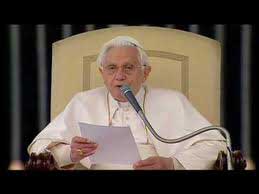
Jesus’ prayer during the Last Supper was the theme of Benedict XVI’s catechesis during his general audience, which was held this morning in the Paul VI Hall in the presence of 4,000 faithful.
The Pope explained how the emotional backdrop to the Last Supper, in which Jesus bade farewell to His friends, was the immanence of His approaching death. Moreover, in the days in which He was preparing to leave His disciples, the life of the Jewish people was marked by the approaching Passover, the commemoration of the liberation of Israel from Egypt.”It was in this context that the Last Supper took place”, the Holy Father said, “but with an important novelty”. Jesus “wanted the Supper with His disciples to be something special, different from other gatherings. It was His Supper, in which He gave something completely new: Himself. Thus Jesus celebrated the Passover as an anticipation of His Cross and Resurrection”.
The essence of the Last Supper lay in “the gestures of breaking and distributing the bread, and sharing the cup of wine, with the words that accompanied them and the context of prayer in which they took place. This was the institution of the Eucharist: the great prayer of Jesus and the Church”. The words the Evangelists use to describe that moment “recall the Jewish ‘berakha’; that is, the great prayer of thanksgiving and blessing which, in the tradition of Israel, is used to inaugurate important ceremonies. … That prayer of praise and thanks rises up to God and returns as a blessing. … The words of the institution of the Eucharist were pronounced in this context of prayer. The praise and thanksgiving of the ‘berakha’ became blessing and transformed the bread and wine into the Body and Blood of Jesus”.
Jesus’ gestures were the traditional gestures of hospitality which a host would extend to his guests, but in the Last Supper they acquired a more profound significance, Pope Benedict explained. Christ provided “a visible sign of welcome to the table upon which God gives Himself. In the bread and the wine, Jesus offered and communicated His own Self”. Aware of His approaching death, “He offered in advance the life that would shortly be taken from Him, thus transforming His violent death into a free act of the giving of Self, for others and to others. The violence He suffered became an active, free and redemptive sacrifice”.
“In contemplating Jesus’ words and gestures that night, we can clearly see that it was in His intimate and constant relationship with the Father that He accomplished the gesture of leaving to His followers, and to all of us, the Sacrament of love”, said the Pope. During the Last Supper Jesus also prayed for His disciples, who likewise had to suffer harsh trials. With that prayer “He supported them in their weakness, their difficulty in understanding that the way of God had to pass through the Paschal mystery of death and resurrection, which was anticipated in the offer of bread and wine. The Eucharist is the food of pilgrims, a source of strength also for those who are tired, weary and disoriented”.
Benedict XVI went on: “By participating in the Eucharist we have an extraordinary experience of the prayer which Jesus made, and continues to make for us all, that the evil we encounter in our lives may not triumph, and that the transforming power of Christ’s death and resurrection may act within each of us. In the Eucharist the Church responds to Jesus’ command to ‘do this in remembrance of me’, she repeats the prayer of thanksgiving and blessing and, therewith, the words of transubstantiation of the bread and wine into the Body and Blood of the Lord.
Our Eucharistic celebrations draw us into that moment of prayer, uniting us ever and anew to the prayer of Jesus”.
“Let us ask the Lord that, after due preparation also with the Sacrament of Penance, our participation in the Eucharist, which is indispensable for Christian life, may always remain the apex of all our prayers”, the Pope concluded. “Let us ask that, profoundly united in His offering to the Father, we too can transform our crosses into a free and responsible sacrifice of love, for God and for our fellows”.
At the end of his catechesis the Holy Father delivered greetings in a number of languages to the pilgrims present in the Paul VI Hall, inviting them to participate with
“faith and devotion” in the Eucharist which, he said, is indispensable for Christian life as well as being the school and culmination of prayer. Addressing young people, the sick and newlyweds, he pointed our that last Sunday’s Solemnity of the Baptism of the Lord is an occasion to reflect upon our own Baptism. “
Dear young people”, the Pope exclaimed, “live your membership of the Church, the family of Christ, joyfully. Dear sick people, may the grace of Baptism ease your sufferings and encourage you to offer them to Christ for the salvation of humanity. And you, dear newlyweds, … base your marriage on the faith which you received as a gift on the day of your Baptism”.
AG/Â Â Â Â Â Â Â Â Â Â Â Â Â Â Â Â Â Â Â Â Â Â Â Â Â Â Â VIS 20120111 (880) (more…)
Tags: catholic, catholic podcast, catholic prayer, cathollc spirituality, eucharist, last supper, lord's supper, prayer
This entry was posted on Thursday, January 12th, 2012 at 9:30 am
You can follow any responses to this entry through the RSS 2.0 feed.
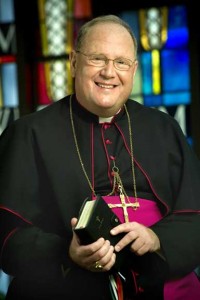 Archbishop Dolan shares a personal story of his experience at World Youth Day in Toronto in hearing a young woman who had been a prostitute talk about how God’s love fundamentally changed her. Dolan defines human dignity, and describes the “doctrine of the dignity of the human person.” This video is the first of four discreet sections of Archbishop Dolan’s full talk. The full presentation is also available on YouTube.
Archbishop Dolan shares a personal story of his experience at World Youth Day in Toronto in hearing a young woman who had been a prostitute talk about how God’s love fundamentally changed her. Dolan defines human dignity, and describes the “doctrine of the dignity of the human person.” This video is the first of four discreet sections of Archbishop Dolan’s full talk. The full presentation is also available on YouTube.
Tags: catholic, catholic podcast, catholic prayer, catholic social teaching, cathollc spirituality, dignity of human person
This entry was posted on Wednesday, January 11th, 2012 at 9:47 pm
You can follow any responses to this entry through the RSS 2.0 feed.
Tags: catholic, catholic podcast, catholic prayer, cathollc spirituality
This entry was posted on Saturday, January 7th, 2012 at 7:01 pm
You can follow any responses to this entry through the RSS 2.0 feed.
Loving unconditionally, as Jesus did, especially those who are the most difficult and challenging….Join Teresa Monag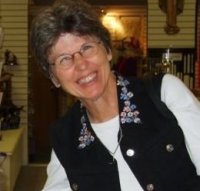 hen, of Pro Sanctity, as she offers a “Personal Plan for Holinessâ€. Listen along with these short, but beautiful meditations which encourage us to continue on our journey as “saints in the makingâ€!
hen, of Pro Sanctity, as she offers a “Personal Plan for Holinessâ€. Listen along with these short, but beautiful meditations which encourage us to continue on our journey as “saints in the makingâ€!
[powerpress]
Learn more about Pro Sanctity at www.prosanctity.org
Tags: catholic, catholic podcast, catholic prayer, cathollc spirituality, personal plan, pro sanctity, teresa monaghen
This entry was posted on Saturday, January 7th, 2012 at 12:29 pm
You can follow any responses to this entry through the RSS 2.0 feed.

